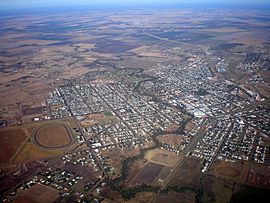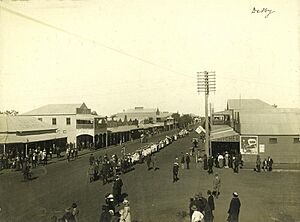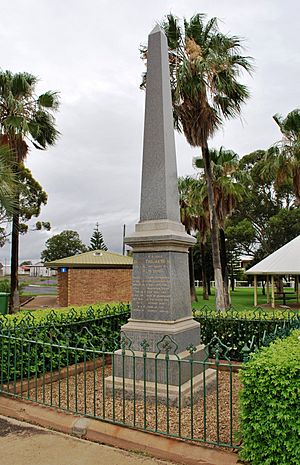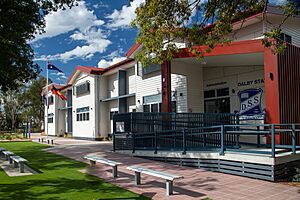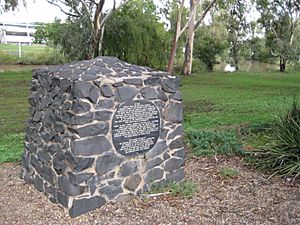Dalby, Queensland facts for kids
Quick facts for kids DalbyQueensland |
|||||||||||||||
|---|---|---|---|---|---|---|---|---|---|---|---|---|---|---|---|
|
(From left to right)
Aerial view of Dalby, Dalby Council Chambers, Dalby Court House, Lake Broadwater, St John's Anglican Church |
|||||||||||||||
| Population | 12,758 (2021 census) | ||||||||||||||
| • Density | 39.401/km2 (102.05/sq mi) | ||||||||||||||
| Postcode(s) | 4405 | ||||||||||||||
| Elevation | 344 m (1,129 ft) | ||||||||||||||
| Area | 323.8 km2 (125.0 sq mi) | ||||||||||||||
| Time zone | AEST (UTC+10:00) | ||||||||||||||
| Location |
|
||||||||||||||
| LGA(s) | Western Downs Region | ||||||||||||||
| State electorate(s) | Warrego | ||||||||||||||
| Federal Division(s) | Maranoa | ||||||||||||||
|
|||||||||||||||
|
|||||||||||||||
Dalby is a town and area in the Western Downs Region of Queensland, Australia. In 2021, about 12,758 people lived here.
Dalby is located on the Darling Downs, a rich farming area. It is also the main administrative center for the Western Downs Region.
Contents
- Discover Dalby's Location
- How Dalby Grew: A Brief History
- Dalby's Population and People
- Important Buildings and Places
- Dalby's Economy: What People Do Here
- Learning in Dalby: Schools and Education
- Local Media and News
- Community Facilities
- Sports and Activities
- Dalby's Unique Attractions
- Dalby's Weather and Climate
- Famous People from Dalby
- Images for kids
Discover Dalby's Location
Dalby is about 82 kilometers (51 miles) west of Toowoomba. It is also around 208 kilometers (129 miles) west-northwest of Brisbane, the state capital. Major roads like the Warrego Highway, Moonie Highway, and Bunya Highway meet here.
This area is known as one of Australia's best places for growing grain and cotton.
How Dalby Grew: A Brief History
Dalby started in the early 1840s near Myall Creek. This creek is a branch of the Condamine River. The first person to settle here was Henry Dennis. He explored the area and chose land for himself and others. Today, a special stone monument in Edward Street marks where Dennis camped.
A small settlement grew to help travelers going north to Jimbour Station. The famous explorer Ludwig Leichhardt visited Dalby in 1844.
In 1853, the government sent Captain Samuel Perry to survey the area for a town. The next year, in 1854, Dalby was officially named a township. The first post office opened in Roche's store that same year.
In 1859, Dalby became part of the new state of Queensland. By 1863, Dalby was officially made a municipality, which meant it had its own local government.
Long ago, people thought Dalby had a very healthy climate. In 1900, the Queensland Government built a special hospital called the Jubilee Sanitorium for people with lung diseases. Later, in 1904, the Dalby Town Council built special baths using warm underground water. People believed bathing in these waters could improve their health. However, by 1938, these baths closed as doctors found better ways to treat illnesses.
The Dalby War Memorial was officially revealed on July 26, 1922. It honors the soldiers who served in wars.
Dalby's Population and People
In 2016, Dalby had a population of 12,719 people. About 7% of the people were Aboriginal and Torres Strait Islander. Most people (84%) were born in Australia. Other common birthplaces included the Philippines, New Zealand, and England.
In 2021, the population of Dalby grew slightly to 12,758 people.
Important Buildings and Places
Dalby has several places that are important for their history and are protected. These include:
- The old Dalby Town Council Chambers and Offices on Cunningham Street.
- St John's Anglican Church, Dalby, also on Cunningham Street.
- St Columba's Convent, Dalby.
- The Dalby Fire Station on New Street.
- Dalby State High School on Nicholson Street.
- The Dalby War Memorial and Gates on Patrick Street.
- The Dalby Olympic Swimming Pool on Patrick Street.
Dalby's Economy: What People Do Here
Dalby is a busy center for many industries. These include large engineering businesses, coal mining, and making fuels like ethanol.
The area around Dalby is very good for farming. The rich black soil helps grow crops like wheat, cotton, and sorghum. Raising animals like pigs, cattle, and sheep is also a big part of the economy. There are two cotton gins near the town that process cotton.
Dalby is also home to Australia's first plant built specifically to make ethanol fuel from grain.
Power and Energy
The Dalby area is becoming a hub for energy production. There is a large coal-fired power station and several coal mines and natural gas wells west of Dalby. Local companies are also planning to build wind turbines on nearby farms.
About 50 kilometers (31 miles) west of Dalby is the Kogan Creek Power Station. This huge power station uses coal to produce electricity.
Learning in Dalby: Schools and Education
Dalby has several schools for students of all ages:
- Dalby State School is a government primary school for students from Preparatory (Prep) to Year 6. It is one of Queensland's oldest state primary schools.
- Dalby South State School is another government primary school, also for students from Prep to Year 6.
- Our Lady of the Southern Cross College is a Catholic school that teaches students from Prep all the way to Year 12.
- Dalby Christian College is a private school that also teaches students from Prep to Year 12. It has an early learning center and offers boarding for high school students.
- Dalby State High School is a government high school for students in Years 7 to 12. Many students from smaller towns nearby come to Dalby for high school because their towns don't have senior schools. The school also puts on a musical play each year, starring its own students.
Local Media and News
Dalby has its own local newspapers, the Dalby Herald and Northern Downs News. There is also the Dalby Magazine.
The town has a community radio station, 89.9 FM 4DDD, which started in 1992.
Most TV and radio services come from Toowoomba, the closest big city. Local news from Dalby is often shown on regional TV news channels.
Community Facilities
The Western Downs Regional Council runs a public library on Drayton Street. The Dalby Library has special "Creative Studios" with modern tools for making music, videos, and other digital projects.
There are also several churches in Dalby, including St Mark's Lutheran Church and Dalby Uniting Church. The Springvale Kupunn branch of the Queensland Country Women's Association also meets here.
Sports and Activities
Dalby has a strong history in rugby League. The senior team is called The Dalby Diehards, and the junior team is The Dalby Devils.
There is also an Australian rules football team called the Dalby Swans. They have men's, women's, and junior teams. Some players from Dalby have even gone on to play at a higher level, like Zimmorlei Farquharson.
Dalby also has a rugby union team, the Dalby Wheatmen, who play against other teams in the region.
Dalby's Unique Attractions
Dalby has a special monument to the Cactoblastis cactorum caterpillar. This caterpillar helped get rid of the prickly pear plant in the 1920s, which was a big problem for farmers. The monument is in a park by Myall Creek.
Dalby's Weather and Climate
Dalby has a warm, humid climate, but it's drier in winter than places closer to the coast. The highest temperature ever recorded was 45.6°C (114.1°F) in December 1913. The coldest was -7.2°C (19.0°F) in July 1895. Dalby gets about 681 millimeters (26.8 inches) of rain each year, mostly from thunderstorms in summer.
Dalby has experienced serious floods. In late 2010, the town had its worst floods since 1981, which affected the water system. In early 2013, another big flood cut the town in half.
| Climate data for Dalby (Dalby Post Office, 1893–1992) | |||||||||||||
|---|---|---|---|---|---|---|---|---|---|---|---|---|---|
| Month | Jan | Feb | Mar | Apr | May | Jun | Jul | Aug | Sep | Oct | Nov | Dec | Year |
| Record high °C (°F) | 44.9 (112.8) |
41.1 (106.0) |
41.6 (106.9) |
36.1 (97.0) |
32.1 (89.8) |
30.6 (87.1) |
27.9 (82.2) |
32.2 (90.0) |
35.8 (96.4) |
39.4 (102.9) |
41.1 (106.0) |
45.6 (114.1) |
45.6 (114.1) |
| Mean daily maximum °C (°F) | 32.0 (89.6) |
31.2 (88.2) |
29.7 (85.5) |
26.6 (79.9) |
22.6 (72.7) |
19.4 (66.9) |
18.7 (65.7) |
20.8 (69.4) |
24.2 (75.6) |
27.6 (81.7) |
30.4 (86.7) |
31.8 (89.2) |
26.3 (79.3) |
| Mean daily minimum °C (°F) | 18.5 (65.3) |
18.2 (64.8) |
16.4 (61.5) |
12.4 (54.3) |
8.2 (46.8) |
5.4 (41.7) |
4.1 (39.4) |
5.2 (41.4) |
8.4 (47.1) |
12.6 (54.7) |
15.6 (60.1) |
17.6 (63.7) |
11.9 (53.4) |
| Record low °C (°F) | 8.1 (46.6) |
8.9 (48.0) |
3.9 (39.0) |
0.6 (33.1) |
−2.2 (28.0) |
−6.1 (21.0) |
−7.2 (19.0) |
−5.4 (22.3) |
−3.9 (25.0) |
−3.3 (26.1) |
4.4 (39.9) |
5.0 (41.0) |
−7.2 (19.0) |
| Average rainfall mm (inches) | 88.0 (3.46) |
76.6 (3.02) |
68.4 (2.69) |
40.9 (1.61) |
35.2 (1.39) |
39.3 (1.55) |
40.1 (1.58) |
28.7 (1.13) |
36.8 (1.45) |
58.5 (2.30) |
74.5 (2.93) |
95.5 (3.76) |
682.5 (26.87) |
| Average rainy days (≥ 0.2mm) | 8.0 | 6.7 | 6.3 | 4.4 | 4.5 | 5.1 | 5.0 | 4.3 | 4.8 | 6.5 | 6.9 | 8.2 | 70.7 |
| Average relative humidity (%) | 43 | 45 | 45 | 43 | 46 | 49 | 46 | 41 | 38 | 39 | 38 | 40 | 43 |
| Source: Bureau of Meteorology | |||||||||||||
Famous People from Dalby
Many notable people have connections to Dalby, including:
- Luke and Cody Cook, who won the TV show House Rules in 2016.
- Brodie Croft, a rugby league player.
- Zimmorlei Farquharson, an Australian rules footballer.
- Jayson Gillham, a classical pianist.
- Alan Jones, a radio host and rugby coach.
- Sir James Killen, a former politician.
- Jason Little, a former professional rugby union player.
- Andrew McCullough, a rugby league player.
- Margot Robbie, a famous actress.
- Steve Price, a rugby league player.
- John Size, a well-known horse racing trainer.
- Carl Webb, a rugby league player for NRL, Queensland, and Australia.
Images for kids
 | Aurelia Browder |
 | Nannie Helen Burroughs |
 | Michelle Alexander |


